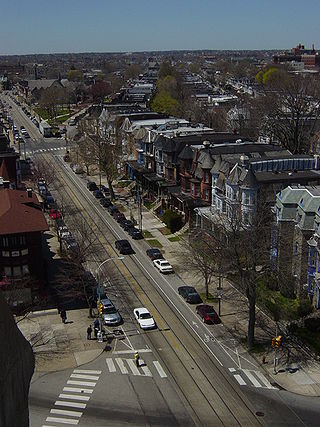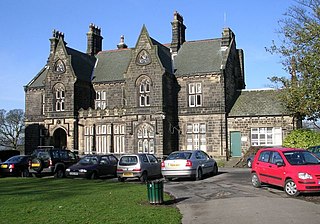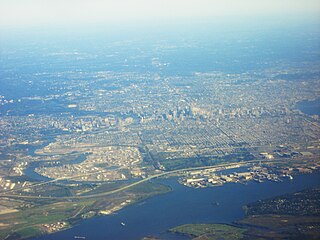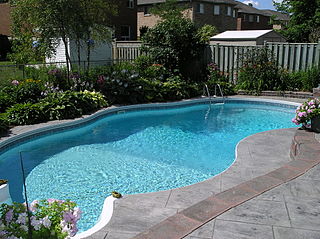Related Research Articles

Yeadon is a borough in Delaware County, Pennsylvania, United States. It borders the city of Philadelphia. The population was 11,443 at the 2010 census.

West Philadelphia, nicknamed West Philly, is a section of the city of Philadelphia. Although there are no officially defined boundaries, it is generally considered to reach from the western shore of the Schuylkill River, to City Avenue to the northwest, Cobbs Creek to the southwest, and the SEPTA Media/Wawa Line to the south. An alternate definition includes all city land west of the Schuylkill; this would also include Southwest Philadelphia and its neighborhoods. The eastern side of West Philadelphia is also known as University City.

Aireborough was a local government district in the West Riding of Yorkshire, England from 1937 to 1974. It was formed through the abolition of the urban districts of Guiseley, Yeadon and Rawdon and enlarged by the addition of parts of Otley urban district and parts of the civil parishes of Esholt, Hawksworth and Menston in the Wharfedale rural district on 1 April 1937. Aireborough Urban District was administered from Micklefield House in Rawdon which had been acquired by Rawdon UDC in 1930. On 1 April 1974 the district was abolished to form the metropolitan district of Leeds.

Mount Washington is an area of northwest Baltimore, Maryland. It is a designated city historic district and divided into two sections: South Road/Sulgrave to the southeast and Dixon's Hill to the north. The Mount Washington Historic District was listed on the National Register of Historic Places in 1990 with a boundary increase in 2001, with five contributing buildings and four contributing structures.

The Philadelphia Clef Club of Jazz and Performing Arts, INC. (PCC) is a tax-exempt, non-profit educational and cultural organization. It was founded in 1966 by members of Musicians' Protective Union Local #274, American Federation of Musicians. Local #274 was chartered in 1935 as a separate Black local because Black musicians were denied membership in the racially segregated Local #77. Local #274 enjoyed its autonomy for more than 36 years. It was the longest surviving independent Black Musicians' Union in the United States, of the more than fifty chartered in major cities.

Facilities and services such as housing, healthcare, education, employment, and transportation have been systematically separated in the United States based on racial categorizations. Notably, racial segregation in the United States was the legally and/or socially enforced separation of African Americans from whites, as well as the separation of other ethnic minorities from majority and mainstream communities. While mainly referring to the physical separation and provision of separate facilities, it can also refer to other manifestations such as prohibitions against interracial marriage, and the separation of roles within an institution. The U.S. Armed Forces were formally segregated until 1948, as black units were separated from white units but were still typically led by white officers.

Southwest Philadelphia is a section of Philadelphia, Pennsylvania, United States. The section can be described as extending from the western side of the Schuylkill River to the city line, with the SEPTA. The northern border is defined by the Philadelphia City Planning Commission as east from the city line along Baltimore Avenue moving south along 51st Street to Springfield Ave. It follows the train tracks until 49th Street. From 49th and Kingsessing Ave the line moves east along Kingsessing Ave. The line then moves south along 46th St to Paschall Ave where it jogs to join Grays Ferry where the line runs to the Schuylkill River.

Pride is a 2007 American biographical film released by Lionsgate Entertainment on March 23, 2007. Loosely based upon the true story of Philadelphia swim coach James "Jim" Ellis, Pride stars Terrence Howard, Bernie Mac, and Kimberly Elise. The film was directed by Sunu Gonera.
The 1943 race riot in Beaumont, Texas was an anti-Black terrorist event that erupted on June 15, 1943 and ended two days later. It was related to wartime tensions in the overcrowded city, which had been flooded by workers from across the South. White workers from the Pennsylvania Shipyard in Beaumont attacked local black residents and destroyed their property following a rumor that a white woman had been raped by a black man. Two black men and one white man were killed in the widespread violence and more than 50 were injured. More than 200 were arrested and black residents were temporarily banned from going to work.
The Fairground Park riot was a race riot that broke out on June 21, 1949, at a newly integrated public swimming pool. The Fairground Park pool was located near Natural Bridge and Vandeventer Avenues in north St. Louis.
James Ellis is an American swim coach who founded the PDR swim team just outside Philadelphia, Pennsylvania, as one of the few predominantly Black swim teams largely for intercity youth. He coached the team from 1971 to 2008, at Nicetown's Marcus Foster Recreation Center outside Philadelphia then moved the team to Nicetown's newly built Salvation Army Ray and Joan Kroc Corps Community Center from 2010-2023 where it became affiliated with the Salvation Army Kroc Center. The 2007 feature film Pride is based on his life story, and focused a great deal of attention on the accomplishments of his swimming program.

A swimming pool, swimming bath, wading pool, paddling pool, or simply pool, is a structure designed to hold water to enable swimming or other leisure activities. Pools can be built into the ground or built above ground, and may be found as a feature aboard ocean-liners and cruise ships. In-ground pools are most commonly constructed from materials such as concrete, natural stone, metal, plastic, composite or fiberglass, and can be of a custom size and shape or built to a standardized size, the largest of which is the Olympic-size swimming pool.
Rubey Mosley Hulen was a United States district judge of the United States District Court for the Eastern District of Missouri. In July 1950, Hulen issued an injunction requiring the City of St. Louis, Missouri to open its fairgrounds and Marquette swimming pools to swimmers of all races.

Portsmouth Northsea Swimming Club (PNSC) in Portsmouth, England, is the largest swimming club in South Hampshire. In recent years, the club has been well known for producing Olympic swimmers including Katy Sexton, MBE, and Gemma Spofforth, as well as Paralympic swimmer and triathlete, Lauren Steadman, OBE. Before pool closures during the COVID-19 pandemic, the club had 250 members between the ages 7 and 74, and offered 80 training sessions a week led by 10 swimming coaches, plus a strength and conditioning coach. Portsmouth Northsea SC uses four pools across the city, with Mountbatten Leisure Centre as its main base, and offers a Learn to Swim Programme, annual Club Championships, Open Meet competitions, and an Easter Swim Festival. PNSC used to compete in the Arena league but got demoted to the Rother league in the last couple of years due to lack of competetiveness.

The 28th Street YMCA is a historic YMCA building in South Los Angeles, California. It was listed as a Los Angeles Historic-Cultural Monument in 2006 and put on the National Register of Historic Places in 2009. The four-story structure was built in 1926 at a cost of $200,000. The building was designed by noted African American architect Paul R. Williams in the Spanish Colonial Revival style.

Lia Neal is an American former professional swimmer who specialized in freestyle events. In her Olympic debut at the 2012 Summer Olympics in London, she won a bronze medal in the 4×100-meter freestyle relay. In 2016, she won a silver medal in the same event at Rio de Janeiro. She was the second female African-American swimmer to make a U.S. Olympic team.
The Anacostia Pool riot took place on June 29, 1949, at a recently-desegregated public swimming pool in the Anacostia neighborhood of Washington, D.C. After two days of tense confrontations between white and black patrons of the pool, a two-hour large-scale disturbance involving 450 people resulted in five arrests and at least four serious injuries. Bill Mabry, one of the black swimmers involved, called the incident “Washington’s first race riot.” Despite pressure to relax the enforcement of the federal government's nonsegregation policy, the Department of the Interior stated that “no backward step of any sort should be made in effectuating the President’s Civil Rights program,” specifically with respect to Washington, DC.
The racial composition of swimming and other aquatic sports has long been influenced by the history of segregation and violence at pools as well as the building patterns of public and private pools in America. The exclusion of people of color from public pools during the 20th century not only denied them a space for recreation and exercise but also perpetuated disparities that persist to this day. African Americans, in particular, continue to be underrepresented in swimming and aquatic sports, many facing barriers such as lack of access to swimming lessons, limited exposure to water-based activities, and lingering stereotypes of swimming as a solely "white" sport.

Nude swimming in US indoor pools was common for men and boys from the late 1880s until the early 1970s, but rare for women and girls. For much of that time period, indoor pool use was primarily for physical education or athletic competition, not recreation. There are regional differences, public indoor pools were more frequently built in Midwest and Northeast states.
References
- 1 2 3 4 5 6 Kodosky, Robert (2024). The Nile Swim Club of Yeadon. Arcadia Publishing. ISBN 9781467156127 . Retrieved 2024-06-25.
- 1 2 3 4 Lee, Nathaniel (2021-05-22). "Ceremony Designates Yeadon's Nile Swim Club as a Pa. Historical Site". The Philadelphia Tribune . Archived from the original on 2024-07-02. Retrieved 2024-06-25.
- 1 2 3 4 Lee, Andrea (December 13, 1982). "American Scene: Life in a Black Suburb". Time : 6–7.
- 1 2 3 McCarthy, Erin (2018-09-13). "The Nile Swim Club, Historic African American pool, Averts Closure in Delaware County". The Philadelphia Inquirer . Retrieved 2024-07-02.
- ↑ "People Are Talking About". Jet . 15 (20): 44. 1959-03-19.